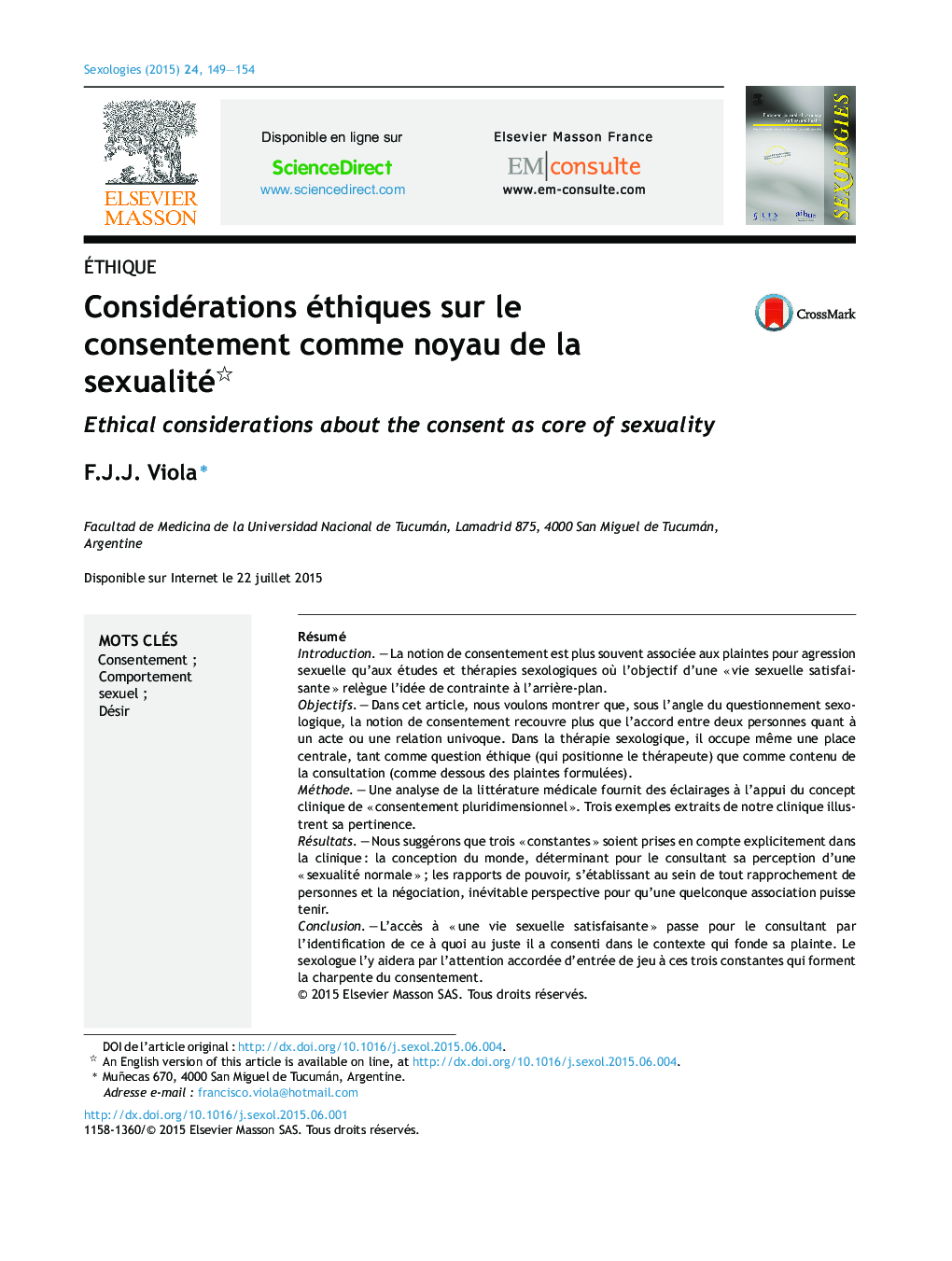| کد مقاله | کد نشریه | سال انتشار | مقاله انگلیسی | نسخه تمام متن |
|---|---|---|---|---|
| 342627 | 548853 | 2015 | 6 صفحه PDF | دانلود رایگان |

RésuméIntroductionLa notion de consentement est plus souvent associée aux plaintes pour agression sexuelle qu’aux études et thérapies sexologiques où l’objectif d’une « vie sexuelle satisfaisante » relègue l’idée de contrainte à l’arrière-plan.ObjectifsDans cet article, nous voulons montrer que, sous l’angle du questionnement sexologique, la notion de consentement recouvre plus que l’accord entre deux personnes quant à un acte ou une relation univoque. Dans la thérapie sexologique, il occupe même une place centrale, tant comme question éthique (qui positionne le thérapeute) que comme contenu de la consultation (comme dessous des plaintes formulées).MéthodeUne analyse de la littérature médicale fournit des éclairages à l’appui du concept clinique de « consentement pluridimensionnel ». Trois exemples extraits de notre clinique illustrent sa pertinence.RésultatsNous suggérons que trois « constantes » soient prises en compte explicitement dans la clinique : la conception du monde, déterminant pour le consultant sa perception d’une « sexualité normale » ; les rapports de pouvoir, s’établissant au sein de tout rapprochement de personnes et la négociation, inévitable perspective pour qu’une quelconque association puisse tenir.ConclusionL’accès à « une vie sexuelle satisfaisante » passe pour le consultant par l’identification de ce à quoi au juste il a consenti dans le contexte qui fonde sa plainte. Le sexologue l’y aidera par l’attention accordée d’entrée de jeu à ces trois constantes qui forment la charpente du consentement.
SummaryIntroductionThe notion of consent is more often associated with situations of sexual assault than with sexological studies and treatments in which the objective and the ideal of a “satisfactory sex life” relegates the idea of constraint to a position of secondary importance.ObjectivesOur intention in this article was to demonstrate that, from the point of view of the issues which might be raised in the field of sexology, the notion of consent covers more than the agreement between two people with regard to an unequivocal act or relationship. In sexological treatment, it even occupies a central position, both as an ethical question (which determines the position of the therapist and the patient) and as the content of the consultation (as something which implicitly underlines the complaints made).MethodAn analysis of the medical and sexological literature provides clarification in support of the clinical concept of “multidimensional consent”. Three examples taken from our clinic illustrate its relevance.ResultsWe suggest taking three “constants” explicitly into account in the clinic: the person's concept of the world, which, for the consultant, determines her perception of “normal sexuality”; the relationships of power, which form the basis of any situation in which persons come closer together; and negotiation, an inevitable prospect if any association is to be maintained.ConclusionFor the consultant, the route to “a satisfactory sex life” must necessarily take a person through an identification of what he/she has effectively consented to within the context, which forms the basis of her complaint. The sexologist will help this person through the attention given from the outset to these three constants, which form the structure of consent.
Journal: Sexologies - Volume 24, Issue 3, July–September 2015, Pages 149–154